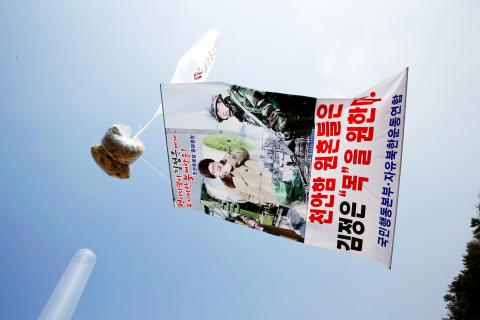South Korean activists launched tens of thousands of anti-Pyongyang leaflets into North Korea yesterday, amid heightened tensions on the divided Korean Peninsula, using a propaganda tool that usually sparks threats of reprisals.
Conservative activists, including many North Korean defectors, have been carrying out leafleting exercises using giant gas-filled balloons for years.
Defector-turned-activist Sanghak Park and his colleagues released 50,000 leaflets tied to three large balloons from an empty field near Paju City close to the border with North Korea, marking the sixth anniversary of the sinking of a South Korean warship with the loss of 46 sailors.

Photo: EPA
Seoul pinned the blame for the sinking on North Korea and froze trade and investment ties.
One of the three balloons was strung with a large banner printed with a Pyongyang-published picture of North Korean leader Kim Jong-un smiling against the backdrop of a missile being assembled.
“Bring down a firestorm on nuclear maniac Kim Jong-un,” the slogan read.
“We plan to launch a total of 10 million leaflets into the North over the next three months condemning North Korea’s nuclear tests,” Park told journalists.
In October 2014, North Korean frontier guards attempted to shoot down a set of such balloons, triggering a brief exchange of fire across the border.
Park and other activists face protests by residents and merchants living near the border, who are concerned that their livelihood might be affected.
Since North Korea’s fourth nuclear test on Jan. 6, South Korea has resumed blasting a mix of K-pop and propaganda messages into North Korea, using giant banks of speakers on the heavily militarized border.
North Korea has responded by dropping its own leaflets over the border, attacking South Korean President Park Geun-hye and returning to psychological warfare methods used in the 1950s and 1960s.

Yemen’s separatist leader has vowed to keep working for an independent state in the country’s south, in his first social media post since he disappeared earlier this month after his group briefly seized swathes of territory. Aidarous al-Zubaidi’s United Arab Emirates (UAE)-backed Southern Transitional Council (STC) forces last month captured two Yemeni provinces in an offensive that was rolled back by Saudi strikes and Riyadh’s allied forces on the ground. Al-Zubaidi then disappeared after he failed to board a flight to Riyadh for talks earlier this month, with Saudi Arabia accusing him of fleeing to Abu Dhabi, while supporters insisted he was

The Chinese Embassy in Manila yesterday said it has filed a diplomatic protest against a Philippine Coast Guard spokesman over a social media post that included cartoonish images of Chinese President Xi Jinping (習近平). Philippine Coast Guard spokesman Jay Tarriela and an embassy official had been trading barbs since last week over issues concerning the disputed South China Sea. The crucial waterway, which Beijing claims historic rights to despite an international ruling that its assertion has no legal basis, has been the site of repeated clashes between Chinese and Philippine vessels. Tarriela’s Facebook post on Wednesday included a photo of him giving a

‘MOBILIZED’: While protesters countered ICE agents, Minnesota Governor Tim Walz activated the state’s National Guard to ‘support the rights of Minnesotans’ to assemble Hundreds of counterprotesters drowned out a far-right activist’s attempt to hold a small rally in support of US President Donald Trump’s latest immigration crackdown in Minneapolis, Minnesota, on Saturday, as the governor’s office announced that National Guard troops were mobilized and ready to assist law enforcement, although not yet deployed to city streets. There have been protests every day since the US Department of Homeland Security (DHS) ramped up immigration enforcement in the Twin Cities of Minneapolis and Saint Paul by bringing in more than 2,000 federal officers. Conservative influencer Jake Lang organized an anti-Islam, anti-Somali and pro-US Immigration and Customs Enforcement

NASA on Saturday rolled out its towering Space Launch System (SLS) rocket and Orion spacecraft as it began preparations for its first crewed mission to the Moon in more than 50 years. The maneuver, which takes up to 12 hours, would allow the US space agency to begin a string of tests for the Artemis 2 mission, which could blast off as early as Feb. 6. The immense orange and white SLS rocket, and the Orion vessel were slowly wheeled out of the Vehicle Assembly Building at the Kennedy Space Center in Florida, and painstakingly moved 6.5km to Launch Pad 39B. If the